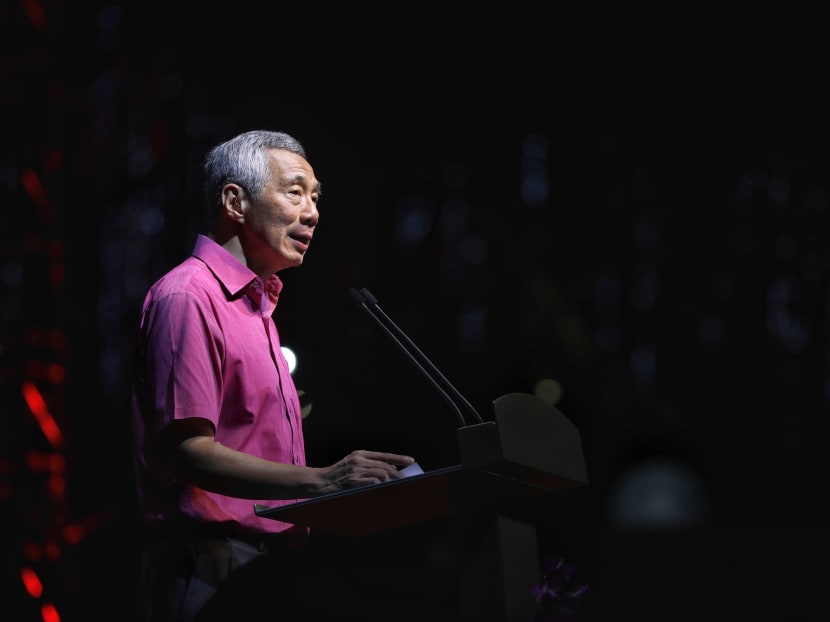Lay offs in 2018 would have been 'much worse' without emphasis on training and upgrading: PM Lee
SINGAPORE — With the retrenchment rate last year dropping to the lowest in more than a decade, Prime Minister Lee Hsien Loong said on Tuesday (April 30) that the situation would have been “much worse” had the Government not “strongly emphasised training, upgrading and redeploying staff”.

In his May Day message, Prime Minister Lee Hsien Loong described efforts to train and upgrade workers as a “marathon without end, but we are making progress”.
SINGAPORE — With the retrenchment rate last year dropping to the lowest in more than a decade, Prime Minister Lee Hsien Loong said on Tuesday (April 30) that the situation would have been “much worse” had the Government not “strongly emphasised training, upgrading and redeploying staff”.
“Companies could have taken the easy way out, retrenching old workers and replacing them with freshly hired new graduates,” he pointed out in his May Day message where he also called on companies and workers to press on with training and upgrading efforts.
He added: “It is a marathon without end, but we are making progress.”
In particular, he noted that efforts to retrain workers and prepare them to handle new technology and different jobs “made a difference”.
Last year, Singapore posted a retrenchment rate of 5.1, based on statistics from the Ministry of Manpower. The rate refers to the number of retrenchments per 1,000 employees.
In the same period, labour productivity also grew by 3.7 per cent. “This is a good result, although progress was not evenly distributed. The gains were largely in the outward-oriented sectors, especially manufacturing. We still need to work harder to improve productivity in domestic services, such as retail and food and beverages,” said Mr Lee.
He stressed that upgrading workers’ skills and retraining them remain a “major long term task”.
To that end, the Government has collaborated with the National Trades Union Congress (NTUC) on programmes under the SkillsFuture movement and the Adapt and Grow initiative.
These programmes are continually enhanced, he noted.
For instance, the Government introduced in this year’s Budget the Automation Support Package and the Productivity Solutions Grant, which will help companies adopt technology and become more productive.
Recounting his visit in January to the Lifelong Learning Institute, Mr Lee said he met Singaporeans there who had upgraded themselves through the Adapt and Grow programmes, and “subsequently taken up new jobs or enhanced responsibilities, sometimes switching firms or even industries”.
“The banks particularly have made a major effort, retraining thousands of counter staff to use new technology and move to different roles,” he said. “We are accumulating more such success stories, which I hope will inspire others to make the effort to improve your skills and productivity.”
STRONG LABOUR MOVEMENT IS ‘CRUCIAL’
Mr Lee also lauded the labour movement which has “good reason to be proud of its record over the last 50 years”.
Among other things, it has played a major role in spearheading efforts on re-employment of older workers, such as building consensus to raise the retirement and re-employment ages, Mr Lee said.
In March, Manpower Minister Josephine Teo announced in Parliament that both the retirement and re-employment ages are set to be raised, although when and by how much is yet to be determined. Details are being finalised, she said then.
The NTUC has also been pushing for the progressive wage model to be implemented which, together with the Workfare Income Supplement (WIS) scheme, has “made a real difference” to lower wage workers, said Mr Lee.
The WIS buttresses the income and retirement savings of eligible workers through cash payments and Central Provident Fund contributions.
Still, Mr Lee noted that the labour movement is entering “another turning point”, given the rapid changes in the external environment.
As “old industries and jobs” are being phased out, new jobs are being created, leading to a situation where the “future of work looks very different”.
“The NTUC must anticipate these challenges, and prepare the unions, union leaders and workers for them early, before they overwhelm us,” he added.
Having a strong labour movement “remains crucial”, Mr Lee stressed. He pointed to the sobering state of affairs in developed countries, where union membership is falling, coupled with a marginalised organised labour.
“Workers’ concerns are not addressed, and they feel bewildered, leaderless and helpless. Not surprisingly, they turn to extreme, nativist political movements that pander to their fears and insecurity, but offer no realistic solutions or inspiring leadership to improve their lives,” he said.
It is a different picture for Singapore as its “constructive and cooperative unions” work together with employers and the Government, delivering “better incomes for workers and steady progress for the country”.
Mr Lee added: “We must stay on this path, and strengthen trust and cooperation among the tripartite partners, so that despite the uncertainties and challenges in the global economy, we can continue to thrive and prosper together as a nation.”
Unlike in previous years, Mr Lee will not be making the keynote speech at the annual May Day Rally, which will be held on Wednesday.
Finance Minister Heng Swee Keat will be taking his place — on the same day that Mr Heng will be promoted to Deputy Prime Minister.
The promotion was among the Cabinet changes announced on April 23, which will see Mr Heng become the sole DPM, with the incumbent DPMs, Mr Teo Chee Hean and Mr Tharman Shanmugaratnam, making way but remaining in the Cabinet as Senior Ministers.






